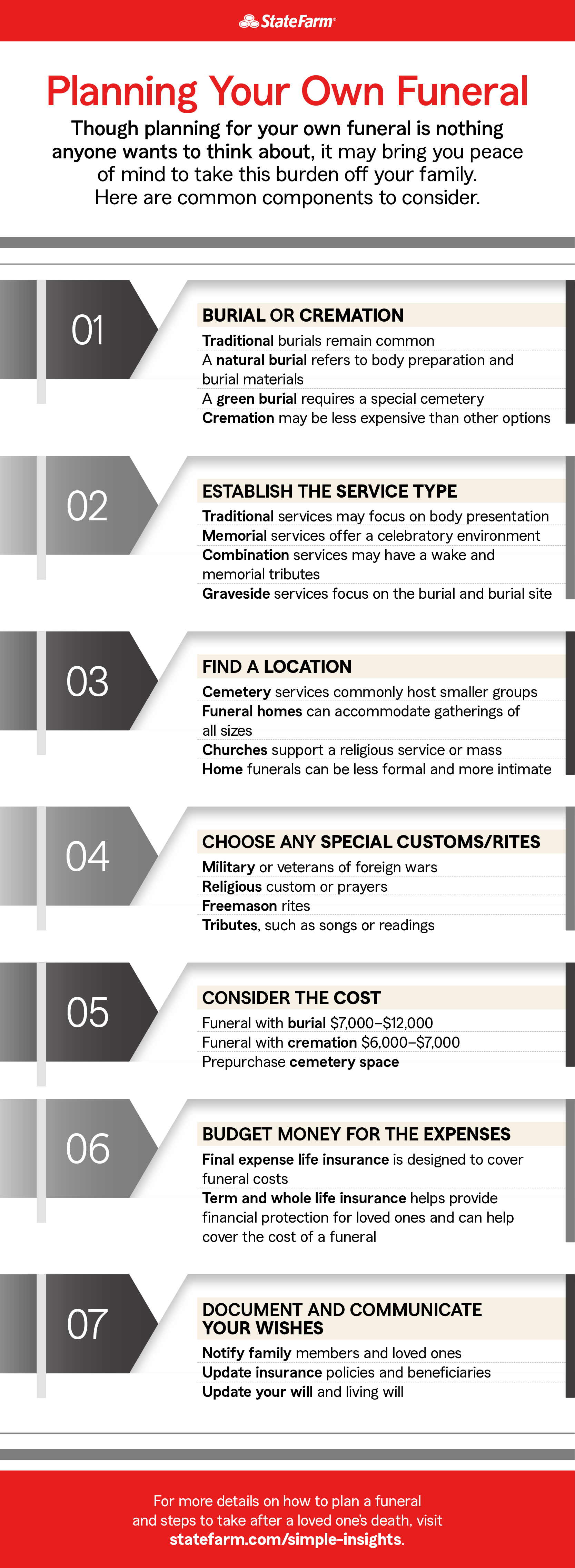What to consider when planning your own funeral
A little funeral preplanning goes a long way to minimize the burden on family.
When you pass away, your loved ones will need to manage the emotional stress of your loss and face the challenge of making funeral arrangements. Planning your own funeral service can be a final gift to them — and bring you peace of mind knowing that the arrangements will reflect your wishes. Although it may be an emotionally difficult process for you, here are a few questions to answer when planning your own funeral:
Burial or cremation?
Your decision may be influenced by religious, environmental and lifestyle preferences. If you decide to be buried, you can opt for traditional or natural burial options.
- Traditional Burial — with a traditional burial, you are embalmed and buried in a casket or vaulted in a cemetery.
- Natural Burial — a natural burial is an eco-friendly funeral alternative in which your body is either left unembalmed or embalmed without harsh chemicals. Then you’re laid to rest in a cloth shroud, wicker basket or biodegradable casket.
- Green Burial — natural burials are often mistaken for green burials, which include a similar burial process but are carried out in special cemeteries that don’t use artificial pesticides.
- Cremation Burial — if you want your remains cremated, decide whether your ashes will rest in an urn, be scattered at a location of special significance or divided among loved ones. You can also opt for your urn to be placed in a casket and buried.
What kind of service?
How do you want loved ones to gather in your honor?
- Traditional services — traditional services often include a viewing or wake that focuses on honoring the loved one who has passed.
- Memorial services — memorial services focus on memories of the deceased during their life. Many opt for a combination service that contains elements of both traditional and memorial services.
- Graveside services — a graveside service can accompany a traditional service or stand on its own. Graveside services are typically short and serve a small gathering of people.
Where will your funeral or memorial service be located?
The location may depend on the type of service you want, but most locations can accommodate your needs.
- Church: supports religious services
- Funeral Home: this traditional viewing option typically accommodates larger groups
- Cemetery: a memorial graveside service that typically hosts smaller groups
- Private Home: depending on local restrictions, you typically can have a viewing in your home or the home of friends or family that is less formal and more intimate
What customs should be included?
Certain traditions can help family and friends remember you in a familiar way. Customs or rituals can be casual, such as having a loved one perform a reading at a service or releasing butterflies or balloons at a burial.
- Religious: you may observe religious customs, such as offering prayers or having a religious service, mass or communion
- Tributes: there are also traditional rites that are performed for specific groups
- Military: veterans or veterans of foreign wars have rites performed at burials
- Freemasons: receive rites at a masonic funeral
How much will it cost?
The cost of your funeral depends on several factors. One of the largest costs associated with a funeral is the burial. Typically, a cemetery plot is not included in the funeral costs — and can often be overlooked. However, while many don’t have full prepaid funeral plans, cemetery plots are one item that can be simple to locate and purchase ahead of time.
- Funeral cost with burial — the average cost of a funeral with a burial is $7,000–$12,000.
- Funeral cost with cremation — the average cost of a funeral with cremation is $6,000–$7,000.
How will it be paid for?
A little funeral preplanning today can help ease the financial burden on your family down the road. You can prepay for certain funeral expenses, or you might consider purchasing one or more types of life insurance:
- Final expense life insurance is designed to cover funeral costs; with guaranteed issue final expense life insurance, you cannot be denied coverage.
- Term and whole life insurance policies help provide financial protection for loved ones and can help cover the cost of funeral expenses.
Have you informed your loved ones?
Once you’ve made your decisions, it’s time to let your loved ones know. It may be a good idea to outline your funeral in conjunction with your living will and end-of-life planning.
Though planning for your own funeral is nothing anyone wants to think about, it may bring you peace of mind to take this burden off your family.
Here are common components to consider.
01 BURIAL OR CREMATION
- Traditional burials remain common
- A natural burial refers to body preparation and burial materials
- A green burial requires a special cemetery
- Cremation may be less expensive than other options
02 ESTABLISH THE SERVICE TYPE
- Traditional services may focus on body presentation
- Memorial services offer a celebratory environment
- Combination services may have a wake and memorial tributes
- Graveside services focus on the burial and burial site
03 FIND A LOCATION
- Cemetery services commonly host smaller groups
- Funeral homes can accommodate gatherings of all sizes
- Churches support a religious service or mass
- Home funerals can be less formal and more intimate
04 CHOOSE ANY SPECIAL CUSTOMS/RITES
- Military or veterans of foreign wars
- Religious custom or prayers
- Freemason rites
- Tributes, such as songs or readings
05 CONSIDER THE COST
- Funeral with burial $7,000–$12,000
- Funeral with cremation $6,000–$7,000
- Prepurchase cemetery space
06 BUDGET MONEY FOR THE EXPENSES
- Final expense life insurance is designed to cover funeral costs
- Term and whole life insurance helps provide financial protection for loved ones and can help cover the cost of a funeral
07 DOCUMENT AND COMMUNICATE YOUR WISHES
- Notify family members and loved ones
- Update insurance policies and beneficiaries
- Update your will and living will





